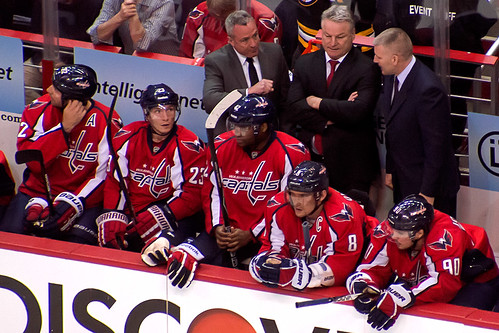
courtesy of photopete
Dale Hunter doesn’t talk much. But the Washington Capitals head coach is quietly leading his team into a Game 7 showdown in Madison Square Garden tomorrow night against the top-ranked New York Rangers.
The quiet but unflappable Hunter seems to exude confidence in his players, and they have responded in kind. Hunter has taken a team troubled by past playoff collapses and turned them into believers in his system and in themselves. The biggest difference between this post-season and the past four playoff failures is the man behind the bench.
There is only one possible explanation: Dale Hunter is actually a Samurai warrior.

Samurai Warriors
courtesy of Nationaal Archief
It is no coincidence that Hunter honed his skills for the NHL as part-owner and coach of the London Knights. The Samurai were, or course, a noble class of knights in Japan for nearly 1000 years.
The Samurai had a value system – or bushido – made up of seven principles: integrity, courage, compassion, respect, honesty, honor and responsibility. In a few short months, Hunter has instilled these virtues into his warriors, whose steel blades are on their feet instead of in scabbards.
Captain Alex Ovechkin has emerged as a responsible leader, doing whatever is asked of him by the new coach. Winger Alexander Semin, once known only as a talented sniper, has recently been seen back-checking.
In these playoffs, the Caps have displayed a growing mutual respect for each other. “You see guys doing all the little things it takes to win hockey games,” said Matt Hendricks after Game 6. “It almost like a wave. It just keeps getting bigger and we’re feeling better and playing harder.”
These Caps are playing with the composure of Stanley Cup veterans. To a man, they are resilient, tenacious and poised. That the Caps lead the league in blocked shots in the playoffs is a testament to the courage of every player. “Everyone is just paying the price and sacrificing for each other,” says John Carlson.
And they have honored the best of the game of hockey. When the Rangers started to get chippy in Game 6, Hunter’s players remained disciplined. “We stay away from it,” said Troy Brouwer. “It’s not part of our game.”

Capitals Coaches Confer
courtesy of clydeorama
Close observation during a game reveals that Hunter rarely moves his lips, letting assistant coaches Dean Evason and Jim Johnson talk to the players. Another Samurai tradition helps us to understand Hunter’s method of communication. It is the practice of haragei which literally translates from the Japanese as “belly art.” We would call it intuition or gut feeling. But it also connotes unspoken leadership. It is undoubtedly Hunter’s character that is the driving force during the game. Instead of issuing verbal commands, haragei enables the Samurai to emanate his will to his subordinates.
Hunter has used his very few words judiciously, with indelible affect. In early March, when the Caps were trailing the Tampa Bay Lightning 2-1 after two periods, the coach had some choice words for the team. No reporters were present, but several players shared their impressions. “The message was to man-up, play hard, and play as a team,” said Karl Alzner. Brooks Laich put it a little more poetically: “He said just quit trying to use your skill and use your will a little bit more.” The Caps went on to win the game in overtime.
Once again, before overtime in Game 7 against the Boston Bruins, Hunter chose to speak. “He simply said, ‘This is the best thing in the world when it comes to playoff hockey,’ Matt Hendricks told the Washington Post. “I think it was just his demeanor.”
Whether they win or lose on Saturday night, the Caps can carry their heads high knowing that they have brought honor to their warrior coach and to their fans. There will be no need for seppuku.